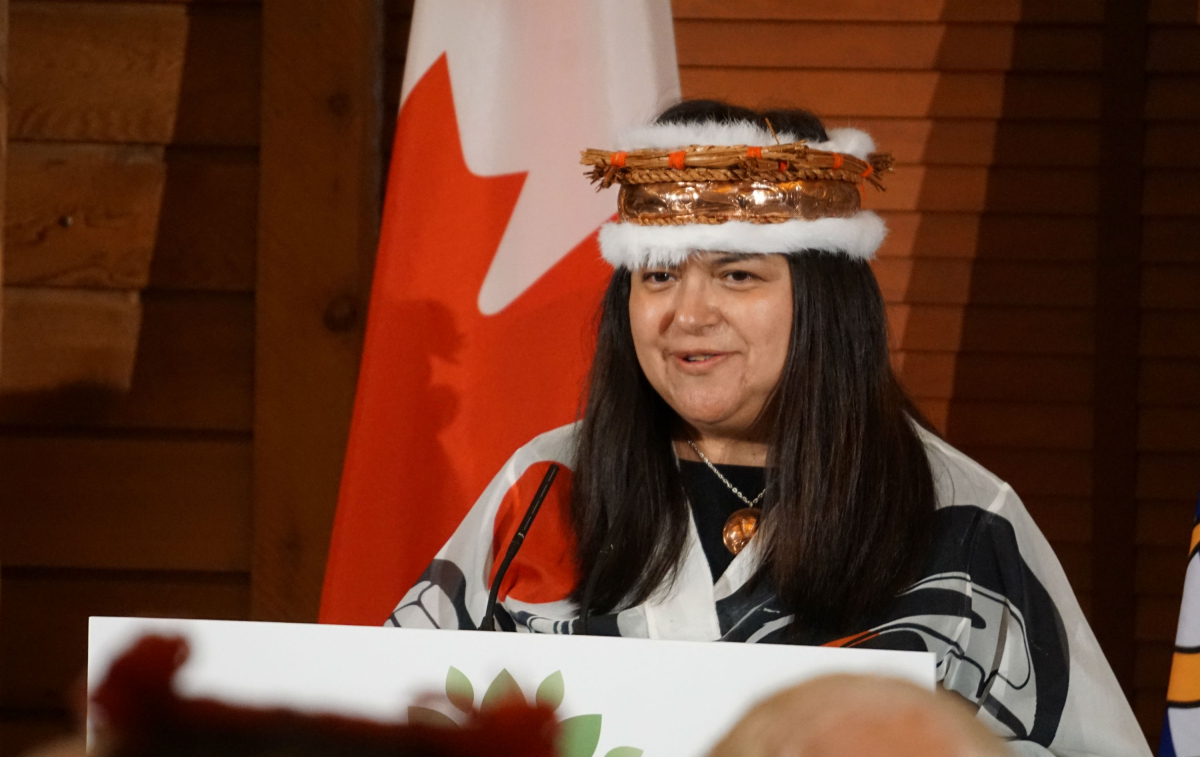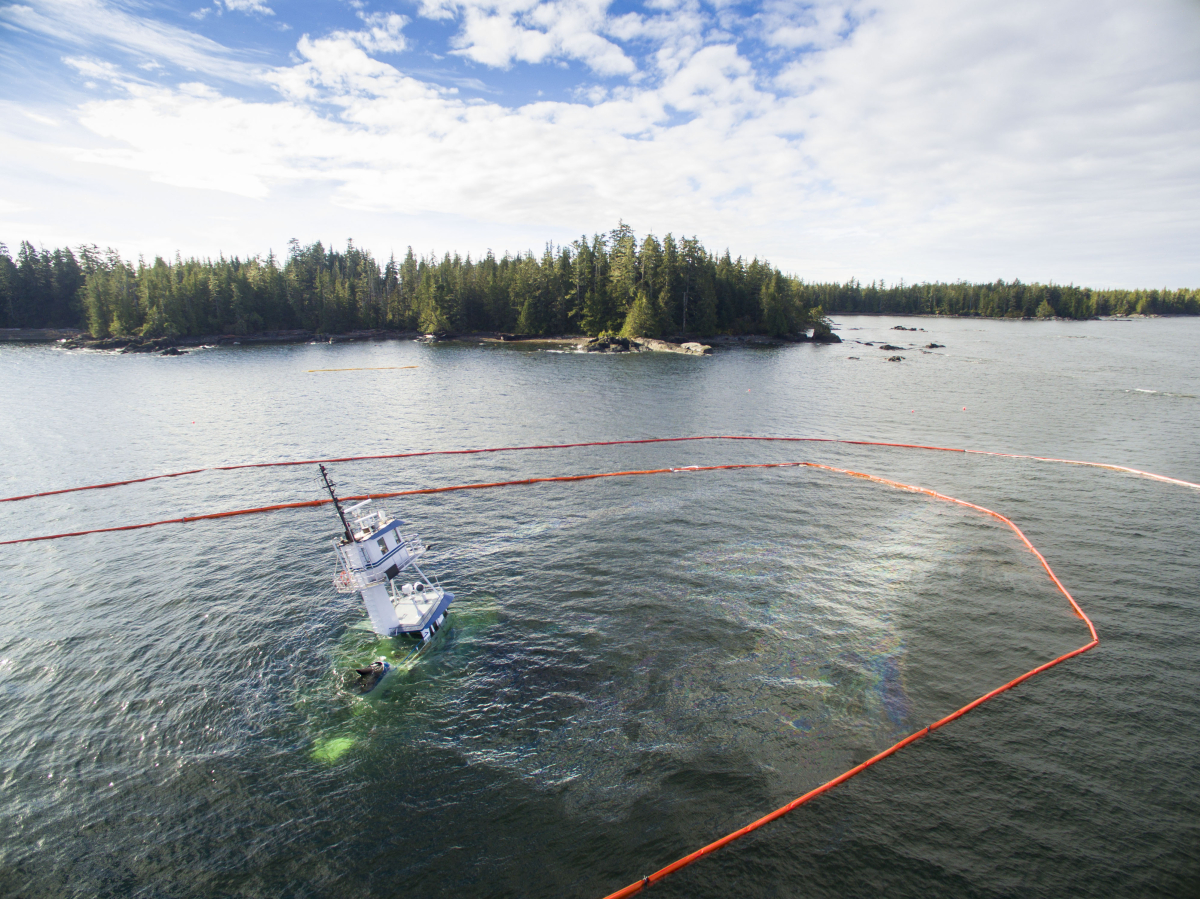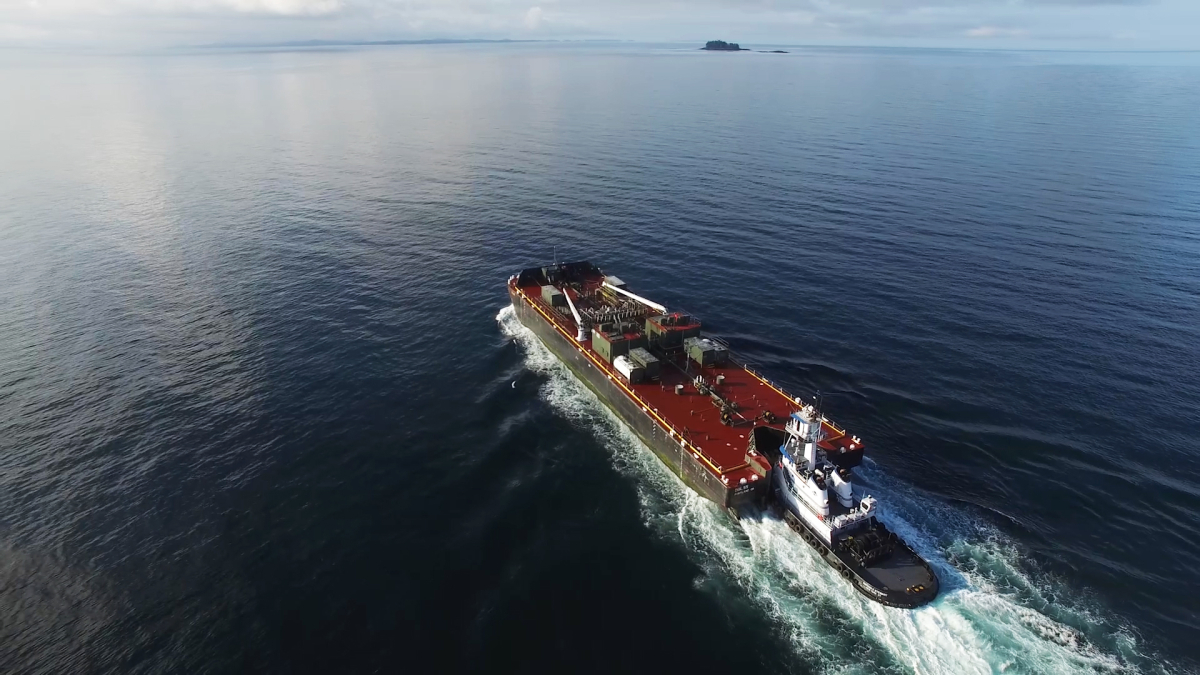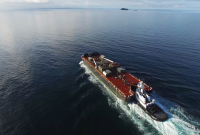Support strong Canadian climate journalism for 2025
Efforts to contain a diesel spill on the British Columbia coast are failing after more than three days of round-the-clock efforts by first responders.
According to the latest report from Kirby Offshore Marine, the Texas-based operator responsible for a tug and barge crash in the Seaforth Channel last Thursday, aerial observers found oil sheen — or "stranded oil" — escaping containment booms at the spill site as well as sheen that had spread to the mouth of nearby Gale Passage.
The environmental damage has already been used to boost arguments against proposed oil and gas pipeline projects that could increase tanker traffic along the pristine waters and inlets surrounding B.C.'s Great Bear Rainforest, a home to a rich and complex ecosystem made up of bears, whales, salmon, wolves and other species.
Proponents of new projects say they have carefully prepared plans to reduce the risk of accidents like these and ensure they are ready to respond if disaster strikes.
Around 1 a.m. on Oct. 13, the Texas company's 10,000-tonne tanker barge and tug unit ran aground on the central Pacific coast, near Bella Bella in Heiltsuk First Nation territory. First responders, including the Canadian Coast Guard, RCMP, Transport Canada, and the First Nation have been on the water since early Thursday morning, assessing and controlling the damage.
"Observations yesterday saw some amount of diesel surfacing from the tug, and some observed to have escaped containment booming during the high tide," said a Monday morning incident update from Kirby Offshore Marine. "All planned booming strategies have been implemented within and at the mouth of Gale Channel; containment and protection booms are being tended as needed."
"Hot tapping" to begin today
Although the barge was empty when it ran aground on Edge Reef last Thursday, the tug — the Nathan E. Stewart — was estimated to have more than 200,000 litres of diesel on board. Both vessels were travelling south from Alaska during the accident in the Seaforth Channel, about 20 kilometres west of Bella Bella.
Efforts to remove the diesel from the water — a process called "hot tapping" — is expected to begin on Monday. An oil skimming vessel is also expected to reach the scene as the tug sits under about nine metres of water and continues to seep fuel from its damaged starboard and central diesel tanks.
While the Transportation Safety Board of Canada has not yet launched an investigation into the crash, Mohan Raman, its manager of regional operations for the Marine-Pacific, told National Observer that its representatives are interviewing the seven-member crew of the Nathan E. Stewart tug. None were injured during the incident, but Raman said the interviews could take the entire day.
"Then we will decide whether we will be launching an investigation or not," he said. "At this point we are just gathering information."
WATCH: Heiltsuk responders keep barge from beach
DFO shuts down local fisheries
Fuel is bubbling up from the tug and the exact amount of diesel spilled remains unconfirmed. The tug itself is partially submerged in a "stable position" (aground in shallow water), and a skimming vessel from Western Canada Marine Response Corporation will be on site Monday afternoon.
In the meantime, the Fisheries and Oceans Canada (DFO) has shut down shellfish harvesting in the area due to pollution and has not provided any indication of when local fisheries will re-open. In a news release, the Heiltsuk First Nation called the accident an unfolding environmental disaster whose fuel has already blanketed the most important clam beds in the territory.
"We don’t know how many years or decades it will be before we are able to harvest in these waters again," said Chief Marilyn Slett in a press statement.
“Yet our community members are heroic. The overwhelming majority of vessels out on the water are Heiltsuk volunteer crews. Our community members are doing their best to assist with response efforts, but have not been receiving adequate direction or training from the Western Canada Marine Response Corporation in charge of the clean up.”

Heiltsuk criticize government response
Responders plan to work overnight in order to speed the clean up process as long−range weather reports show an approaching storm with winds of up to 90 kilometres per hour, due late Wednesday. The Heiltsuk First Nation said that spill response has been hindered by slow response time, a lack of boats, appropriate equipment and personnel.
Only two of the community's manila clam harvesting grounds are still open after the incident, putting at risk $150,000 of annual income the species brings in for local fishermen and families. The nation's requests to interview crew members of the Nathan E. Stewart have been denied.
“Recent press seems to suggest that containment efforts have been successful. Let me set the record straight: containment has not been successful, and clean-up efforts have barely begun,” said Heiltsuk on-scene commander William Housty. “The damage has been done, and the best we can work towards is mitigation.”
While it's hoped the tug can be lifted from the water by crane and barged out of the area once its fuel tanks have been pumped out, the entire accident has put pressure on the Trudeau government to implement its tanker ban for the B.C. coast quickly. In November last year, the newly-elected prime minister ordered Transport Minister Marc Garneau to formalize a crude oil tanker ban on B.C.'s northern coast but federal representatives have refused to provide even a tentative date for the policy.
"Minister Garneau and Transport Canada officials have been meeting with Indigenous groups, environmental NGOs and industry to seek their views on marine environmental protection and ship operations since January 2016," said a Monday email statement from the ministry's senior media relations official, Natasha Gauthier.
"These consultations will inform a government decision on how to advance the tanker moratorium and measures to enhance marine safety, protect the environment and communities, and support inclusive economic development."
On Friday, the federal NDP added its voice to the chorus of First Nations and environmentalists calling for the policy to come swiftly into effect. On Monday the NDP demanded answers from Garneau in the House of Commons.
Increased pressure for tanker ban
“British Columbians are waking up today, imagining if this had been a fully loaded super tanker, and thinking about the devastation it could have done to fishing resources, First Nations communities, and our environment,” said NDP MP for Skeena-Bulkey Valley, Nathan Cullen, in a press release.
"When will the Liberals make good on their promise to protect our coasts and implement a permanent ban on crude-oil tankers off B.C.'s north coast?" asked his colleague, MP Fin Donnelly, in the House of Commons on Monday.
In response to Donnelly, Garneau told members of Parliament that improving marine safety is a priority of the Liberal government and his ministry "will have things to say shortly" on the tanker ban after further collaboration with DFO and the Canadian Coast Guard.
"In the meantime, I should let the member know that the Pacific Pilotage Authority has revoked the exemption for piloting for the company in question; the TSB is on location; I have appointed a ministerial observer,; and we at Transport Canada will be conducting a compliance inspection."
Last Friday, a story in the Vancouver Sun revealed that the very same tug, the Nathan E. Stewart, had been adrift in Alaskan waters carrying more than 2 million gallons of diesel fuel in 2011, and had been making weekly trips using a waiver from the Pacific Pilotage Authority that exempted it from a requirement to have Canadian pilots on board.
The Texas-based Kirby Corporation is also a previous offender, and last month, its Kirby Inland Marine LP paid nearly $5 million in civil penalties after it spilled more than 4,000 barrels of oil in the Houston Ship Channel in March 2014.

Government applauds clean up efforts
Environment and Climate Change Canada and Transport Canada did not answer questions comparing the spill in the Seaforth Channel to possible oil tanker spills from the proposed Enbridge Northern Gateway pipeline, given that the matter remains under investigation. An email statement from Environment Canada however, confirmed that its representatives are on the water providing twice-a-day site-specific weather forecasting, conducting overflights, investigating "resources at risk" from the spill, analyzing the characteristics and behaviour of the diesel in the Seaforth Channel, and creating a spill trajectory.
"Environment and Climate Change Canada takes pollution incidents and threats to the environment very seriously. On the matter of enforcement, ECCC has authority for enforcing the Migratory Birds Convention Act, 1994 and the pollution prevention provisions of the Fisheries Act, including those provisions prohibiting the discharge of harmful substances into areas frequented by migratory birds, and deleterious substances into waters frequented by fish."
Transport Canada also confirmed in an email that it will conduct a compliance and enforcement inspection pursuant to the Canada Shipping Act, 2001 once initial clean up has been completed, and "will not hesitate to take appropriate action."
Despite comments from B.C. Premier Christy Clark last Friday criticizing the federal government's response to the fuel leak (she said the province has been "cheated" out of coast guard investment for decades now), Fisheries and Oceans Minister Dominic LeBlanc applauded the Coast Guard's response. In a scrum before Question Period on Monday, he also acknowledged the B.C. premier's criticism:
"Well first of all, I thought the Coast Guard, in the difficult circumstances in the middle of the night, did a terrific job, most importantly, in saving, or ensuring there was no loss of life," he told reporters. "But I take what the Premier said very seriously. The Prime Minister has mandated the Minister of Transport and me to work with him to improve coastal security and marine safety.
"Mr. Garneau and I have consulted a lot of people, a lot of people in the industry. We have some specific ideas of things that we can do to improve, particularly around environmental response on all of the Canadian coasts, but certainly we understand the concern of British Columbians and we're working diligently to ensure that we have an absolutely world class response system."
— with files from Canadian Press
Editor's Note: This story was updated at 2:30 p.m. PT on Monday to include comments from Transport Canada, Environment and Climate Change Canada, the NDP, and Fisheries and Oceans Canada.
This report was made possible thanks to reader subscriptions. Please subscribe today.






Comments
'Working diligently to ensure absolutely we have a world class response system' eh? That's what they all say,.
As it does consistently, the National Observer has published another important article. Unfortunately, such articles are not published by the mainstream media. For example, mainstream media would focus more on remarks like those of Fisheries and Oceans Minister, Dominique LeBlanc who “applauded the Coast Guard's response”. In a scrum, LeBlanc stated "Well first of all, I thought the Coast Guard, in the difficult circumstances in the middle of the night, did a terrific job, most importantly, in saving, or ensuring there was no loss of life". So much for Liberal concern for the environment. There was not a word about it in LeBlanc’s comments.
As mentioned by William Housty of the Heiltsuk first nation, “Recent press seems to suggest that containment efforts have been successful. Let me set the record straight: containment has not been successful, and clean-up efforts have barely begun,” his statements are confirmed by the rest of the narrative on the activity at the site of the collision and the leaked diesel fuel. This is information that should be available to all Canadian citizens and particularly those in British Columbia. Yet mainstream media has yet to deal adequately with the story or any other important subject in a substantive way from the perspective of providing relevant information to citizens.
This crash and release of diesel fuel in the ocean have renewed calls for a ban on tanker traffic carrying oil along the West Coast. This has been countered by “proponents of new projects (who) say they have carefully prepared plans to reduce the risk of accidents like these and ensure they are ready to respond if disaster strikes”. This lack of transparency points to a characteristic that makes Canada’s claim to being a democracy pathetic. For example, we are not told by the proponents what the risk was reduced from and to. Was risk of an incident reduced from 90% to 85%? We don’t know and therefore cannot judge the adequacy of that kind of statement.
The proponents also suggest that “they have carefully prepared plans to ... ensure they are ready to respond if disaster strikes“. Really?!. Of course there is no detail as to what they are prepared to do. What is currently being done according to the Texas-based operator responsible for the crash is summed up by comment "All planned booming strategies have been implemented within and at the mouth of Gale Channel; containment and protection booms are being tended as needed." If so, the plans are clearly inadequate as were preventative measures. For example, the so-called booming strategies clearly did not take into account the possibility that rising tides would sweep some oil over the booms. Furthermore, although a strong plan for remediation is necessary, the emphasis should be on prevention. There is nothing on that topic.
Dominique LeBlanc suggests that an accomplishment has taken place because “...the Pacific Pilotage Authority has revoked the exemption for piloting for the company in question”. What the government should be asking and investigating is why the exemption was granted in the first place. This investigation should produce detailed information about how the decision was reached and who reached it. There should be consequences. Possibly the conditions for exemptions should be changed to no exemptions.
Apparently, in 2011, the tug involved had been adrift in Alaskan waters carrying 2 million gallons of diesel fuel. Further, “the Texas-based Kirby Corporation is also a previous offender, and last month, its Kirby Inland Marine LP paid nearly $5 million in civil penalties after it spilled more than 4,000 barrels of oil in the Houston Ship Channel in March 2014".. In my view, it is clear that in order to move forward on the environment when any project that could affect the environment iis proposed, the environmental record of those making the proposal should be examined in full. Where previous incidents occurred, the company should be forced to offer some kind of credible explanation and financial guarantee against such incidents occurring with their proposed approach to the new project
In some kind of e-mail, Environment and Climate Change Canada indicated that “"Environment and Climate Change Canada takes pollution incidents and threats to the environment very seriously”. That remains to be proved. In the past, Canadian governments have folded like a cheap shirt and issued penalties that were probably less than the coffee fund at the head offices of the corporations they were serving. It’s time for serious action and serious penalties.
Apparently, the crew of the tug refused to be interviewed by the leaders of the indigenous people affected by crash and spill. Those refusing to be interviewed should be escorted by the RCMP or the Armed Forces to a place where they can be interviewed by those most affected by the spill. They should be allowed to get lawyers but if they still refuse an interview they should be thrown in jail until they accept. It is time to stop kowtowing to powerful corporate interests.
Finally, the article points out that “.... Fisheries and Oceans Canada (DFO) has shut down shellfish harvesting in the area due to pollution and has not provided any indication of when local fisheries will re-open”. Apparently this will put at risk hundred and $150,000 of annual income that would go to local fishermen and families. The Corporation responsible should be forced to pay hundred and $150,000 per year until shellfish harvesting can resume in the affected areas.
The Liberal government has said that there should be a balance between the environment and the economy. So far it looks like decisions in favor of the economy are dominating and the environment is once again relegated to a non-status situation. This is unacceptable and the government should be called to account for it.
Scant if any mention of this in the eastern main stream media. It's like an unofficial sort of censorship. And the DFO minister should be visiting and the Prime Minister also. Is it being down played in order to leave the opportunity to approve a pipeline? They should be getting on with the tanker ban.
THE BELLA BELLA LESSON;
Does this Bella Bella spill incident provide a clear signal that First Nations should manage a significant part of the coastal community spill cleanup/rescue infrastructure…Look at their contribution in past marine disasters such as the Queen of the North and MV Leviathan II, whale watching vessel capsized.(Oct 2015), incidents, etc.,etc…
There is no option but to continue carrying supplies to remote coastal communities with tug managed barges .
However when it comes transporting bulk quantities of bitumen we can ,and must , exclude the much larger ocean bound ,oil laden vessels from our inlets and narrow passages…such as in Douglas Channel and the Salish Sea(Island passes)…We have an opportunity now to ‘correct’ the Enbridge and Kinder Morgan ill-conceived marine shipping proposals …while relying on improved ‘local spill’ handling for the smaller oil laden barges.
Until we can eliminate human error we must do our best to minimize the probability of a ‘tanker-size’ spill in our busy, environmentally sensitive ,multi-billion dollar revenue generating waters…by mandating that the larger tankers are prevented from ‘sailing’ in our tricky island bound waters…and restrict them to open sea terminal locations…such as Port Simpson.
Carl Shalansky, P. Eng. (Retired)
Blog: https://redfern3359.wordpress.com/
(604) 986-4657